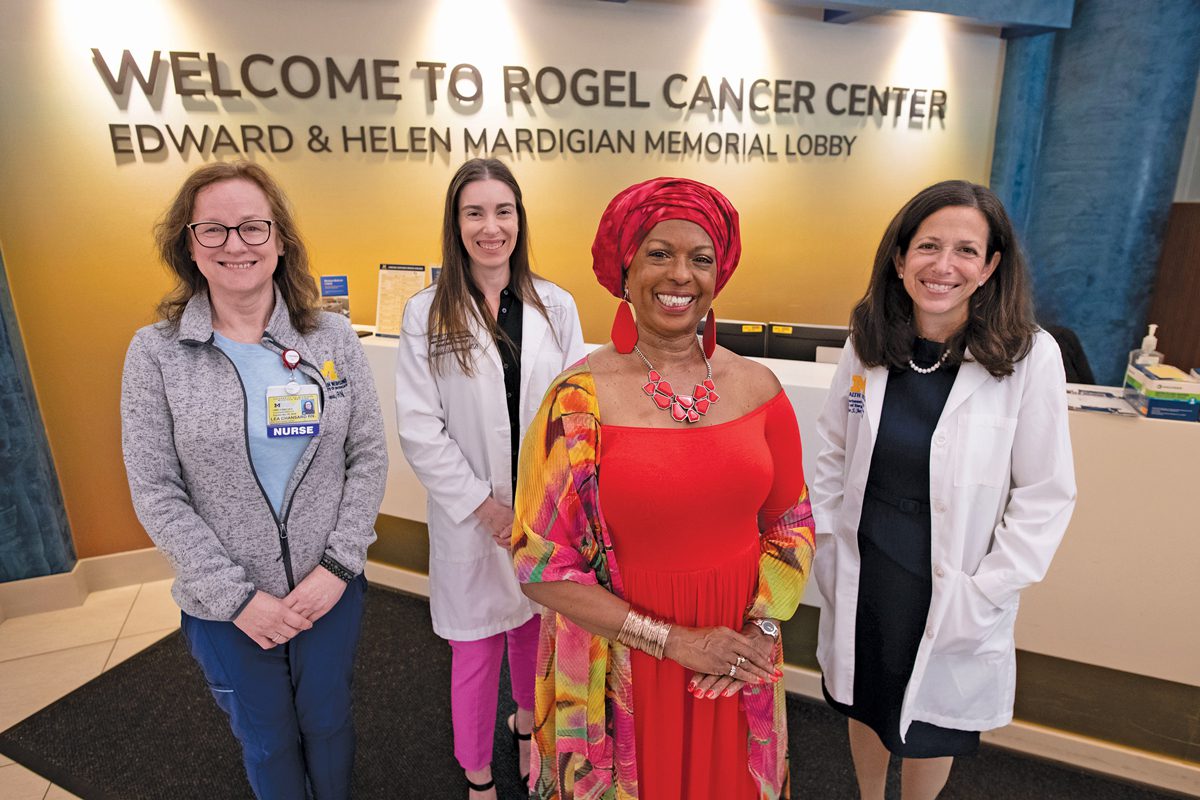
Singer-songwriter Joan Belgrave (center) with Rogel Cancer Center nurse Lea Chansard and physicians Monika Burness and Jacqueline Jeruss. During her treatment, “I promised my doctors that if they kept me alive, I would do a fundraiser for them,” she says—a promise she’ll keep in an August 17 concert. | Photo by Mark Bialek
At sixty-seven, Joan Belgrave’s recent story is one of loss and recovery, from dealing with the death of her husband, legendary jazz trumpeter Marcus Belgrave in 2015, to receiving a cancer diagnosis in 2021. Her road to becoming cancer-free features a rare treatment plan that has been available only to her thus far in Michigan—and an August benefit concert to help future patients receiving the treatment.
An Ann Arbor native, Belgrave is a two-time Grammy-nominated singer-songwriter. Four years after her husband died, her life took another dramatic turn when a routine biopsy resulted in an especially dangerous diagnosis: “triple-negative” breast cancer.
“For the last twenty years, my bumps were always cysts,” says Belgrave. But this time, “the biopsy came back that it was cancer.”
A 2021 study found that Black women with triple-negative breast cancers are 28 percent more likely to die within five years than their white counterparts who received the same diagnosis.
“It has to be treated differently than regular breast cancer. It comes on suddenly, aggressively, and it happens especially to Black women, and we die from it a lot,” says Belgrave. “Within four weeks, my tumor went from [a size of] 1.6 centimeters to five centimeters.”
The day after receiving her diagnosis, Belgrave was surprised to receive a call from a longtime friend. “I know people from Motown [Records] because of Marcus,” she says. “This particular mega-Motown star called me that day because he is presenting Marcus’s trumpet at the National Museum [of African American History and Culture] in Washington.
“He heard something in my voice, and after I told him the news, he said, ‘Don’t worry, I got you.’ The next week, he flew me out to Los Angeles.”
Her friend arranged for Belgrave to meet with doctors in Santa Monica, who “set up a treatment plan for me and told me that I had to have twenty-six infusions.”
But “because it was in California, my insurance did not cover it,” Belgrave adds. Her friend was willing to pay, but “they were going to charge him $20,000 per infusion. I decided to return to Michigan, where my insurance will cover the plan.”
The half-million-dollar treatment centered on infusions of Keytruda, an immunotherapy that had been used successfully on head and neck cancer but not, at the time, for breast cancer. Belgrave also went through thirty rounds of radiation therapy and six months of oral chemotherapy with Xeloda, a drug used to treat metastatic breast cancer.
“The University of Michigan was very excited because they had not used this treatment,” Belgrave says. “I was the first person to have it. … It’s scary—it makes you weak, all your hair falls [out]. I had blisters on my hands and feet.” But she completed the eighteen-month regimen in February of last year and is “100 percent cancer-free right now.”
Related: Ringing the Good Luck Bell
During her treatment, “I promised my doctors that if they kept me alive, I would do a fundraiser for them,” she says. She’ll honor that commitment next month with a fundraiser dedicated to U-M’s Rogel Cancer Center’s breast cancer department, specifically the center’s cold cap program. The caps chill the scalp during chemotherapy, reducing blood flow to the hair roots and limiting hair loss.
But the cap “does not work on Black people, and they did not know why,” Belgrave says. She told her doctors, “Let’s raise the money to find out, and more people can benefit from this treatment.”
For the August 17 benefit at the Ann Arbor Sheraton Hotel, “I solicited some of my friends,” says Belgrave. “The Miracles featuring Mark Scott and the Stubbs Girls will perform. I will perform, and we will close it with a jazz swing dance.”
Sponsors Don Hicks of Multiverse Investments and the Kresge Foundation “will cover the expense and the hotel,” she adds. A mobile mammogram truck will be on site to provide X-rays.
“Had I not received that amazing treatment expeditiously, I would probably not be here,” Belgrave says. “Everybody does not have a wonderful person to fly them to L.A. and give them the best doctors, but this is my effort to make sure they can get the same treatment.”




